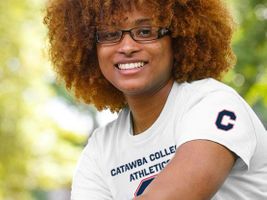Catawba College's Theatre Arts Department continues to be nationally ranked. It is rated fourth in the nation this year, according to the 2006 edition of The Princeton Review's "The Best 361 Colleges" guide which hit bookstands Tuesday, August 23.
Catawba College students, whose comments were cited in the publication, said the theatre arts department "offers excellent training in a variety of areas." "You can get fairly specialized degrees, including Bachelor's of Fine Arts in Performance, Musical Theatre, Directing, or Technical Theatre," the students noted. They also explained that this department encourages students to explore areas outside of their concentration so they are well-rounded and have a broad appreciation for what is involved in putting on a theatre production.
"All of the schools in this book are academically outstanding," said the Princeton Review's lead author Robert Franek. "We hope it will help college applicants and their parents decide which college is best for them."
Although institutional officials submit annual data concerning enrollment, tuition, financial assistance, and SAT averages, it is survey information provided by the students who attend a particular institution which provides an insider's view of a college or university.
Catawba College students who responded to this year's survey also lauded the environmental science program for providing "an entirely environmentally conscious building, plus an entire preserve protected and dedicated to studying and preserving wildlife." Business and athletic training were also cited as strong academic programs.
Catawba College students said "the administration and professors at Catawba are awesome" and "there for you for any problem you have, whether it's school-related or personal." These same students noted the benefit of small classes and friendly peers. Life on campus, they termed, "generally enjoyable" with plenty of student activities.
This year's guide notes that Catawba has a 16:1 student/faculty ratio, with its professors garnering a 93 percent rating in their ability to interest their students and an 88 percent rating in their accessibility to students. Additionally, professors, and not graduate assistants, teach all undergraduate courses offered.
Established in 1851, Catawba College is the sixth oldest college in North Carolina. A private, coeducational college affiliated with the United Church of Christ, Catawba has deliberately chosen to remain a four-year institution rooted in the liberal arts tradition. Its purpose is to enrich the educational experiences of students and to prepare these students for productive and meaningful lives of purpose following their graduation.
